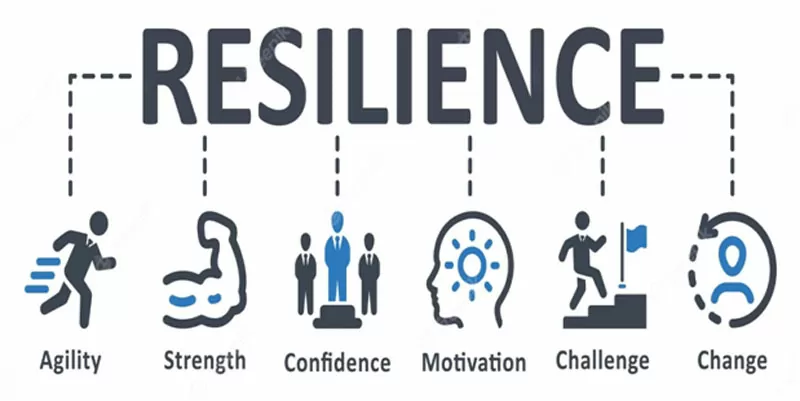Resilience refers to the ability to bounce back and adapt in the face of adversity or stress. It is the capacity to recover quickly from difficult experiences and to overcome challenges. Resilience is a combination of abilities and attitudes that may be built and reinforced through time rather than a permanent attribute.
Resilience involves a combination of factors, including:
- Positive mindset: Resilient individuals tend to have a positive mindset and are able to see opportunities and possibilities even in the face of adversity.
- Flexibility: Resilient individuals are flexible and adaptable, and are able to adjust their approach to meet the demands of different situations.
- Social support: Resilient individuals have a strong support system of family, friends, or other loved ones who can provide emotional support and encouragement.
- Coping skills: Resilient individuals have effective coping skills, such as problem-solving, self-regulation, and emotion regulation, that help them manage stress and overcome challenges.
- Self-efficacy: Resilient individuals have a sense of self-efficacy, or the belief in their ability to handle difficult situations and overcome challenges.
Resilience is an important trait that can help individuals thrive in the face of adversity and stress. It can be developed and strengthened through various means, such as seeking support from loved ones, practicing self-care, developing coping skills, and cultivating a positive mindset.
The Importance of Resilience
Resilience is an important trait that can help individuals cope with adversity and stress, and thrive in the face of challenges. Here are some reasons why resilience is important:
- Personalized Guidance: “Online therapy” connects individuals with qualified therapists who can provide personalized guidance and strategies to enhance resilience. Therapists can help individuals identify their strengths, develop coping mechanisms, and navigate challenges that may affect their mental health and overall resilience.
- Physical health: Resilience can also have a positive impact on physical health, helping individuals to manage chronic conditions, recover from illnesses or injuries, and maintain healthy habits such as exercise and nutrition.
- Goal Setting and Action Planning: Through online counseling sessions, individuals can collaboratively work with therapists to set meaningful goals and create action plans. Therapists can provide guidance and strategies to help individuals navigate obstacles, make positive changes, and develop resilience in the face of challenges.
- Professional success: Resilience can be an important factor in professional success, helping individuals to overcome setbacks, adapt to changing circumstances, and achieve their goals.
- Relationships: Resilience can also have a positive impact on relationships, helping individuals to navigate conflict, build stronger connections, and maintain healthy boundaries.
Overall, resilience is an important trait that can help individuals to cope with adversity and stress, and to thrive in all areas of life. It can be developed and strengthened through various means, such as seeking support from loved ones, practicing self-care, developing coping skills, and cultivating a positive mindset.
Ways to Build Resilience
Over time, resilience is a talent that can be honed and increased. Here are some techniques for increasing resiliency.:
- Practice self-care: Take care of your physical and emotional health by getting enough sleep, eating a balanced diet, exercising regularly, and engaging in activities that bring you joy.
- Cultivate a positive mindset: Focus on the positive aspects of situations and try to see opportunities and possibilities even in the face of adversity.
- Build strong relationships: Surround yourself with supportive people who can provide emotional support and encouragement during difficult times.
- Develop coping skills: Learn effective coping skills such as problem-solving, self-regulation, and emotion regulation, to help you manage stress and overcome challenges.
- Set realistic goals: Setting achievable goals can help you stay motivated and focused, and give you a sense of purpose and direction.
- Practice gratitude: Cultivate a sense of gratitude by focusing on the positive aspects of your life and expressing appreciation for the people and things that bring you joy.
- Develop flexibility and adaptability: Be willing to adjust your approach and try new things when faced with challenges or obstacles.
- Seek support: Don’t be afraid to seek support from mental health professionals or other resources if you need help building resilience or coping with difficult situations.
- Build on your strengths: Identify and build on your strengths and abilities, and use them to overcome challenges and achieve your goals.
- Practice stress management: Develop healthy coping mechanisms to manage stress effectively. This can include deep breathing exercises, mindfulness meditation Inflatable Seals , journaling, or engaging in activities that help you relax and unwind.
- Learn from past experiences: Reflect on past experiences and use them as opportunities for growth and learning.
Conclusion
Overall, building resilience is a process that takes time and effort Rubber Diaphragm. By practicing self-care, cultivating a positive mindset, building strong relationships, developing coping skills, setting realistic goals, practicing gratitude, developing flexibility and adaptability, seeking support, building on your strengths, and learning from past experiences, you can strengthen your resilience and cope more effectively with stress and adversity.




